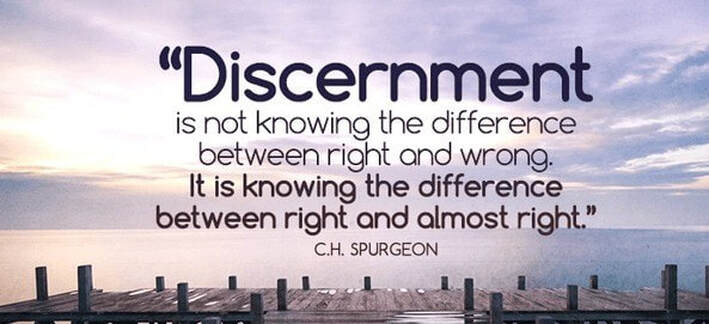Matthew 5:13-16
 Michael Kelly
Michael Kelly
“You are the salt of the earth. But if the salt loses its saltiness, how can it be made salty again? It is no longer good for anything, except to be thrown out and trampled underfoot. “You are the light of the world. A town built on a hill cannot be hidden. Neither do people light a lamp and put it under a bowl. Instead they put it on its stand, and it gives light to everyone in the house. In the same way, let your light shine before others, that they may see your good deeds and glorify your Father in heaven” (Matt. 5:13–16). In this context, what do salt and light have in common? It’s that they are both meant to be used. For flavor. For sight. For enhancements. For making things more clear. When we believe the gospel, we are meant to serve this same role.
--Michael Kelly; Outreach Magazine; Is it Possible to Be Too Focused on Heaven? 5/17/24
--Michael Kelly; Outreach Magazine; Is it Possible to Be Too Focused on Heaven? 5/17/24
 Sam Powell
Sam Powell
“How you are fallen from heaven, O Lucifer, son of the morning! How you are cut down to the ground, You who weakened the nations! For you have said in your heart: ‘I will ascend into heaven, I will exalt my throne above the stars of God; I will also sit on the mount of the congregation On the farthest sides of the north; I will ascend above the heights of the clouds, I will be like the Most High.’ Yet you shall be brought down to Sheol, To the lowest depths of the Pit. (Isaiah 14:12–15)
Notice the echoes of the same themes—the tower reaching to heaven. We will be like the most high. We will exalt our throne. We will sit on the mount of the congregation of the Lord. Read the whole chapter. Isaiah is speaking about the spirit that drives Babylon, and every kingdom of this earth.
In other words, “We will establish the kingdom of God on this earth. We will build cities. We will pass laws. We will deal with evil-doers. We will create a society, a City on the Hill. And there will be no more curse.”
View it from the backdrop of the description of Babel. This is a major theme throughout the Bible, but I only want to focus on one aspect of it.
The Tower was built with bricks and mortar, and the original readers of Genesis would have known exactly what that meant. Someone had to make the bricks and build the buildings.
That would not have been Pharaoh, the one with the grand plan. It would have been the slaves.
And so comes the downfall of every single scheme to build the kingdom of God on this earth. Someone has to make the bricks.
Even the founding of our own country, which many claim is the “City on the Hill”, using the phrase of the puritans. Who did the work?
Dabney complained after the slaves were set free that he hardly had time to write anymore because of all the menial labor that wasn’t getting done.
In our own state, the California Indians were enslaved to harvest the crops and build the cities. The adobe houses weren’t going to build themselves.
The “City on the Hill” is a grand idea, until you think about who is making the bricks. One thing is for sure. The one who says, “Come let us make bricks” is NOT the one who is actually making the bricks. The one who holds the whip is the one giving the commands. The one at the other end of the whip is making the bricks.
At the end of Genesis 11, there is a contrast. We are introduced to a new character. Abraham. God gives Abraham a promise and Abraham believes it. And he learns to wait for it.
Hebrews 11 tells us this:
By faith he dwelt in the land of promise as in a foreign country, dwelling in tents with Isaac and Jacob, the heirs with him of the same promise;10 for he waited for the city which has foundations, whose builder and maker is God. (Hebrews 11:9–10)
Abraham lived in tents his whole life, because he waited for another kind of city. A city where God makes the bricks and builds the city.
Dwell on that for a moment.
There is no oppression, no vanity under the sun, no pain and toil.
And truly no more curse. No curse for anyone, for God will take it on himself.
HE makes the bricks and prepares a place for you. And you can dwell in a tent while you wait, if that is what it takes. THIS is the kingdom of God. --Sam Powell; Lambs Reign Who’s Building The Bricks Of Nationalism? 11.2.22
Notice the echoes of the same themes—the tower reaching to heaven. We will be like the most high. We will exalt our throne. We will sit on the mount of the congregation of the Lord. Read the whole chapter. Isaiah is speaking about the spirit that drives Babylon, and every kingdom of this earth.
In other words, “We will establish the kingdom of God on this earth. We will build cities. We will pass laws. We will deal with evil-doers. We will create a society, a City on the Hill. And there will be no more curse.”
View it from the backdrop of the description of Babel. This is a major theme throughout the Bible, but I only want to focus on one aspect of it.
The Tower was built with bricks and mortar, and the original readers of Genesis would have known exactly what that meant. Someone had to make the bricks and build the buildings.
That would not have been Pharaoh, the one with the grand plan. It would have been the slaves.
And so comes the downfall of every single scheme to build the kingdom of God on this earth. Someone has to make the bricks.
Even the founding of our own country, which many claim is the “City on the Hill”, using the phrase of the puritans. Who did the work?
Dabney complained after the slaves were set free that he hardly had time to write anymore because of all the menial labor that wasn’t getting done.
In our own state, the California Indians were enslaved to harvest the crops and build the cities. The adobe houses weren’t going to build themselves.
The “City on the Hill” is a grand idea, until you think about who is making the bricks. One thing is for sure. The one who says, “Come let us make bricks” is NOT the one who is actually making the bricks. The one who holds the whip is the one giving the commands. The one at the other end of the whip is making the bricks.
At the end of Genesis 11, there is a contrast. We are introduced to a new character. Abraham. God gives Abraham a promise and Abraham believes it. And he learns to wait for it.
Hebrews 11 tells us this:
By faith he dwelt in the land of promise as in a foreign country, dwelling in tents with Isaac and Jacob, the heirs with him of the same promise;10 for he waited for the city which has foundations, whose builder and maker is God. (Hebrews 11:9–10)
Abraham lived in tents his whole life, because he waited for another kind of city. A city where God makes the bricks and builds the city.
Dwell on that for a moment.
There is no oppression, no vanity under the sun, no pain and toil.
And truly no more curse. No curse for anyone, for God will take it on himself.
HE makes the bricks and prepares a place for you. And you can dwell in a tent while you wait, if that is what it takes. THIS is the kingdom of God. --Sam Powell; Lambs Reign Who’s Building The Bricks Of Nationalism? 11.2.22
 John Stott
John Stott
“God intends us to penetrate the world. Christian salt has no business to remain snugly in elegant little ecclesiastical salt cellars; our place is to be rubbed into the secular community, as salt is rubbed into meat, to stop it going bad. And when society does go bad, we Christians tend to throw up our hands in pious horror and reproach the non-Christian world; but should we not rather reproach ourselves? One can hardly blame unsalted meat for going bad. It cannot do anything else. The real question to ask is: Where is the salt?”
― John Stott
― John Stott

“As we grow in grace, we become a blessing to the world around us, and the world, in terms of its relations to us, is blessed or cursed. This means that the politics of the world capitols, however important, is not as determinative of the future as the faithfulness of the covenant people to their God and to His covenant law-word. When history wallows needlessly in the seas of politics, it is simply because the rudder of the ship, the Christian, is giving no direction and is neither a curse nor a blessing, only salt which has lost its savor and is good for nothing except to be thrown out on the road of history, “to be trodden under foot of men” (Matt. 5:13).” ― R.J. Rushdoony
 Kaitlyn Schiess
Kaitlyn Schiess
City on a hill—this captivating little phrase has a complicated American history, one that often ignores the phrase’s true origin: not among the Puritans, but in Christ’s Sermon on the Mount. The phrase was used by the governor of the Massachusetts Bay colony, John Winthrop, in his 1630 treatise “A Model of Christian Charity”: “For we must consider that we shall be as a city upon a hill. The eyes of all people are upon us.” Historians are not certain when (or if) Winthrop delivered the speech, but the popular story is that he gave it on the flagship Arbella to his fellow Puritan travelers on their way to Salem, Massachusetts.
Winthrop’s words have been called the “most famous lay sermon in American history” and the “book of Genesis in America’s political Bible,” but his treatise went virtually unnoticed for centuries. There are only a few scattered references to Winthrop’s speech before the middle of the twentieth century. That is, until John F. Kennedy drew on increasing interest in the religious roots of America’s founding—comparing the “hazardous” voyage America was embarking upon in 1961 to the voyage Winthrop took in 1630.
But it was Ronald Reagan who would transform city on a hill into “one of the most familiar lines in the liturgy of the American civil religion.” Reagan used the phrase to lend moral weight and divine sanction to his political project, and few politicians since have been able to resist doing the same. For instance, in the 2016 election, Hilary Clinton encouraged an audience by saying that “we’re still Reagan’s shining city on a hill.” - Kaitlyn Schiess; Christianity Today; Politicians, You Keep Saying ‘City on A Hill’ 8.25.23
Winthrop’s words have been called the “most famous lay sermon in American history” and the “book of Genesis in America’s political Bible,” but his treatise went virtually unnoticed for centuries. There are only a few scattered references to Winthrop’s speech before the middle of the twentieth century. That is, until John F. Kennedy drew on increasing interest in the religious roots of America’s founding—comparing the “hazardous” voyage America was embarking upon in 1961 to the voyage Winthrop took in 1630.
But it was Ronald Reagan who would transform city on a hill into “one of the most familiar lines in the liturgy of the American civil religion.” Reagan used the phrase to lend moral weight and divine sanction to his political project, and few politicians since have been able to resist doing the same. For instance, in the 2016 election, Hilary Clinton encouraged an audience by saying that “we’re still Reagan’s shining city on a hill.” - Kaitlyn Schiess; Christianity Today; Politicians, You Keep Saying ‘City on A Hill’ 8.25.23
As disciples and followers of Christ, we are not to hide. We are to be used for God’s glory. Our faith in Him should not be hidden. It should be something all can see. When we turn on the lights in a room, we can see the dust, the dirt, the scuff marks, and the stains. We can see what needs cleaning. As lights for Christ, we shine lights on areas of society that need cleaning, areas that are opposed to God. Christians are not to adhere to the whims of the world. We are to stand strong in the light of the Lord and lead others to Him. --Forgiveness Foundation
 Derek Prince
Derek Prince
As Christians, our function as salt is to give flavor to the earth. God enjoys this flavor. Unappetizing food becomes tasty and acceptable when seasoned with salt. Job asks this rhetorical question: “Can flavorless food be eaten without salt?” (Job 6:6). The presence of salt makes the difference, causing us to enjoy food we would otherwise refuse to eat. Our presence makes the earth acceptable to God and commends the earth to His mercy. Because we are here, God continues to deal with the earth in grace and mercy rather than in wrath and judgment. Our presence makes the difference. This principle is vividly illustrated in the account of Abraham’s intercession on behalf of Sodom, as recorded in Genesis 18:16–33. The Lord told Abraham that He was going to Sodom to see if that city’s wickedness had come to the point where judgment could no longer be withheld. Abraham then walked with the Lord on His way and reasoned with Him about the situation. -Derek Prince; The teaching Legacy of Derek Prince

The usage of salt in the ancient world gives us insight into what Jesus meant by His analogy. One of the first things that comes to mind when we think about salt is that it adds flavor to food. Christians are to add a divine flavor to the world. However, this analogy has to be cautioned with the fact that the world finds us boring. The world considers Christians to be stuffy and restrictive. We are a rain storm on the world’s parade. The flavor the righteous adds is real, but it is not what the world is looking for.
The worldly are bent toward hedonism in finding whatever pleasure they can wherever they can. The unrighteous want to be entertained or find excitement. They are dependent on something outward to bring happiness and meaning to life. But the Christian has a savor that is internal. We do not need to be chasing around after the things for which the world strives. A truly godly individual can find great joy and beauty in just being still before God. We have an excitement about life that can continue despite outward circumstances. Our lives have meaning that transcends the here and now. One of my concerns about modern American Christianity is this movement that replaces worship with entertainment. Yes, worship and our lives should be dynamic and vibrant. We should not be like the clergymen of whom Oliver Wendell Homes reportedly said that he might have entered the ministry except these men always looked and acted like undertakers. Christians should be alive and vibrant, but that should be internally generated as we focus on God, not artificially generated by putting on an exciting show. It is becoming increasingly common for churches to set themselves up like nightclubs with a darkened seating area and plenty of lights focused on the stage. How can you follow along in your Bible if you cannot see it? But that is not necessary with such preachers for their goal is to tickle your ears, not explain to you God’s Word. I will be direct, neither I nor the musicians nor anyone else who steps up on this platform during a worship service is here to entertain you. We are here to prompt you to think deeply about God and worship Him. The ones that are really on stage are you folks sitting out there as God watches from heaven and observes the worship of your heart. The Christian is salty and adds flavor to life, but that flavor is not the hot spices the world desires. We must be very cautious about mimicking the world lest we end up losing what God wants us to be. --Pastor Scott L. Harris Grace Bible Church, NY |

Let’s take a look at Mark 9:42-50, another passage that references salt. In this passage, Jesus is spelling out, in graphic detail, the importance of making sure that you take any measure necessary to avoid sin. Now obviously he is not suggesting that we go out and maim ourselves because sin is much deeper than our hands or feet or eyes, it is a heart issue. But at the very end of this passage he says; “Salt is good, but if it loses its saltiness, how can you make it salty again? Have salt in yourselves, and be at peace with each other.”
Now why on earth does he end this section with this sentence? What does he mean by telling us to “have salt in ourselves”, and what relation does this have with taking whatever means necessary to avoid and keep sin from our lives? Here’s what I would like us to think about: To have salt in our lives means that we are to have Jesus in our lives, thus the flavor. But more importantly, we are to have an allegiance to Christ, and Christ alone. We are to have a wholehearted commitment to him as his disciples and followers. The NIV Study Bible note on this verse states that the distinctive mark of discipleship, typified by salt, is allegiance to Jesus and the gospel. So what does allegiance to Christ look like? Does that mean that I say my pledge of allegiance to Christ every day before I go off to school or work just like I did when I was in grade school with the flag? Of course not, but to have an allegiance is to have the mindset of a disciple. To understand allegiance you must also strive for a life of obedience. To be a disciple and to have salt in our lives is to be obedient. We have an understanding of the fact that God’s ways are much higher and more perfect than anything that we could cook up on our own. It is the ability to look at my life as not my own but Christ’s through me. -City of Hope Boise |

So then, knowing this is addressing the Christian Church, how can the Salt become tasteless and worthless? There are two elements in salt and Science has discovered that it is extremely difficult to separate them, but once they have been separated they can never be united again. This is a picture of an apostate that is described in Hebrews 10 and Hebrews 6. In Hebrews 27 when a Christian yields their will back to sin by throwing away their confidence in Christ permanently, they can never be re-united again. This is not the state of a backslider who goes astray but the kind of Christian described in Galatians who nullifies the work of Christ in their lives by going back to the Old Covenant and thus falling from grace. It’s speaking of a permanent choice to return to the world and sin. Anyone who feels conviction and guilt for sin has not committed this sin of apostasy. Please note that the writer includes himself “if we sin willfully” when addressing them about this apostasy so that it could not be talking to unbelievers in any state or form but it is to Christians he writes the message. Hebrews 10:32-35 proves that these were Christians because they had suffered the loss for following Christ and began with confidence that they should not cast away. He is talking to “the Just” ones who are living by faith and tells them that if they “draw back” God will no longer delight in them. That is the context of Hebrews 10 and that is how salt loses it’s element of taste. -Edible

Christians are to be the salt of the earth. When we want to stress a person’s worth we often say that he or she is the salt of the earth. In the ancient world, salt was highly valued. The Greeks called salt divine. Salt performs two important functions. It is the commonest of all preservatives. It keeps things from going bad. For millions of people in the world, salt still has this purpose. In the second place, salt gives taste and flavor to food. Food without salt is insipid.
The Christian’s task is to be the salt of society, preserving, reconciling, adding taste, giving meaning where there is no meaning, giving hope where there is no hope. It is about the quality of life. It is interesting that when the early Christians were persecuted in the Roman Empire, the Christian Apologists pleaded for tolerance saying that society continued to exist because of Christians. What they were saying was that Christians upheld the good values in life, they worked for reconciliation and peace, and they prayed for the empire and its well being. -Religion Online |

The challenges facing the Church today are very real, but the temptation to blend in with the world isn’t new. Jesus refused to water down or compromise His teaching to make it more acceptable. If He had, of course, we wouldn’t be here now.
The first believers risked everything to follow Him. They wouldn’t compromise either, and it cost them their lives. The same still happens to many of our brothers and sisters today. Will we have to look them in the eye one day and apologise? Or will we shrug, ‘That may have been right for you, but we interpreted it differently’? Yes, we need to be relevant. We need to be welcoming. Above all, we need to show love – because without it we’re no better than clanging cymbals. But we’re called to follow the One who said, over and over, ‘You shall be holy, for I am holy’ (e.g. Lev 11:45, 19:2, 20:26). Holiness seems to be a bit underrated nowadays. We talk more about washing our hands than about inner purity and being set apart for the Lord. Yet that has to remain our main focus, because if we lose our ‘saltiness’ we will be good for nothing. ‘Do not love the world or anything in the world,’ John wrote. ‘If anyone loves the world, love for the Father is not in them’ (1 John 2:15). The fact is, no matter how ‘relevant’ we are we’re called to be apart from the world, not a part of it. -Jill Boniface |

Salt is supposed to be a metaphor for wit or wisdom according to some. (E.g., see Colossians 4:5-6.) This would make more sense of the next sentence, which uses a verb that most often means “be made foolish,” and which seems to have gotten its meaning of “be made insipid” mainly on the strength of Matthew 5:13 and Luke 14:34. It’s about equally difficult to relate to salt being made foolish and to salt being made tasteless, maybe especially in 2019. According to some commentators, if salt has impurities, the salt itself can leach away and leave the non-salty impurities behind, which may explain that. Certainly, it is silly and laughable to think of salting salt.
Should we wonder why the earth needs salt? Salt is generally a good thing in the Bible, and has to be added to burnt offerings and to incense, which might be significant, but it can also be a really bad thing, especially vis-à-vis the actual earth. There are several Biblical references to salt of this negative kind, aside from Lot’s wife (e.g., Deuteronomy 29:23, Judges 9:45, Jeremiah 17:6) – where salt is associated with uninhabitable places. That doesn’t seem to be what Jesus means here, which may be why no one mentions it, but it seems important to bear in mind that the goodness of salt depends on context. -Matters of Interpretation
Should we wonder why the earth needs salt? Salt is generally a good thing in the Bible, and has to be added to burnt offerings and to incense, which might be significant, but it can also be a really bad thing, especially vis-à-vis the actual earth. There are several Biblical references to salt of this negative kind, aside from Lot’s wife (e.g., Deuteronomy 29:23, Judges 9:45, Jeremiah 17:6) – where salt is associated with uninhabitable places. That doesn’t seem to be what Jesus means here, which may be why no one mentions it, but it seems important to bear in mind that the goodness of salt depends on context. -Matters of Interpretation
| "Right in the middle of the Beatitudes, Jesus tells His disciples that they are the SALT of the Earth. Preachers love to talk about what that means to us today. They mention that salt is a preservative. I’m sure that’s important. But I think it’s all about the taste. The primary value of salt comes from its taste. Jesus says that when salt loses its taste, it’s worthless, tossed out and trodden under foot. In Paul’s letter to the Thessalonians, he instructs them to pray without ceasing. God works in us. He changes us from the inside out, “from glory to glory.” We put off the “old man” and put on the “new man.” The New Man tastes saltier and that’s better. " |

The Christian mind is not the whole solution, but it is an indispensable part of our Christian commissioning to be salt and light in the world (Matthew 5:13-16). Unless we do our part to hone our intellect to the glory of God, we diminish our positive influence in society – we become dim lights and salt that isn’t salty. Only with a redeemed Christian intellect can we cannot realistically expect to transform the intellectual features of the university system, local government, major media, healthcare system, k-12 school system, the judicial system, or any other institution that is shaping the landscape of society. -Intelligent Christian Faith
You have the ability to bring praise to the Father from others.
Luther said that it is as well-pleasing to God to sweep the floor as to preach the gospel if it is done in the right spirit. This has not always been the church view, however. Hans Nielsen Hauge joined Luther on this point. Hauge and his friends laid their emphasis upon everyday Christianity. His associates became capable farmers, craftsmen, business men, and men of affairs. And they did all these things without it affecting the inner spiritual life.
A danger exists in being overanxious to proceed in earthly calling. The desire for gain and profit often takes the upper hand completely. One ceases to work for the Lord and looks upon the whole thing as his own, even though one is generous at times and gives to the Lord a little of that which one otherwise regards as personal possessions.
A son gave this tribute a his father at his funeral: “I desire to say a few words about father. Father was a Christian at home. That is to me greater than all the good things that have been said here today about father’s life and work.”
Luther said that it is as well-pleasing to God to sweep the floor as to preach the gospel if it is done in the right spirit. This has not always been the church view, however. Hans Nielsen Hauge joined Luther on this point. Hauge and his friends laid their emphasis upon everyday Christianity. His associates became capable farmers, craftsmen, business men, and men of affairs. And they did all these things without it affecting the inner spiritual life.
A danger exists in being overanxious to proceed in earthly calling. The desire for gain and profit often takes the upper hand completely. One ceases to work for the Lord and looks upon the whole thing as his own, even though one is generous at times and gives to the Lord a little of that which one otherwise regards as personal possessions.
A son gave this tribute a his father at his funeral: “I desire to say a few words about father. Father was a Christian at home. That is to me greater than all the good things that have been said here today about father’s life and work.”
Jesus simple illustration forces us to acknowledge that lighting a lamp and putting a cover over it is irrational. Lighting a lamp and then hiding it under a basket not only diminishes its brilliance, but suppresses its power to illuminate. -Olive Tree Alliance

Our Savior Jesus Christ tells us in Matthew 5:13-14 that we are the "salt of the earth" and the "light of the world"—we who are also the weak and the foolish of this world (I Corinthians 1:27). Mentally, when we hear such praises from God, some of us look both ways and behind, and say, "He must be talking about someone else." We struggle to overcome, and we feel we are always "a day late and a dollar short." Though we wish with all our heart that we were more like God, His image in us seems all the more elusive.
But Jesus did not lie in saying these things. As salt gives food a rich, pleasant taste, we are those who are to give a good flavor to the lives of those we encounter. There should be something in our conduct that shows the fruit of the life to which God has called us.
He goes on to say that, if we are not "radiating with flavor"—reflecting the teachings of God in our lives—what use are we, especially to God Himself? Salt without flavor has no use, and it can even be detrimental to the things it comes in contact with. Maybe its best use is to be put on icy roads, to be ground under the tires of vehicles and then washed away.
In Christ's other metaphor, light illuminates what was once dark; it reveals things that were hidden. Though we may be poor, considered old and over the hill, uneducated and obscure, when we live our lives as He instructs, we are a brilliant beacon to this tired and confused world. Our lives can shine a spotlight on the solutions to many common problems experienced by our friends and neighbors.
Jesus points out that we should not hide our light under a basket (verse 15), but live it in the open for all to see. We can set a proper example of the abundant way to live. We should give everyone we meet the light of our loving concern, the light of our honesty, the light of joy and peace, the light of godly family relations, the light of good work habits, and all the other rays of light contained in God's way.
In doing this, we will initially bring attention upon ourselves, and this may at times become uncomfortable. Righteousness has an uncanny tendency to bring out the worst in carnal human beings. Ultimately, however, we will glorify God the Father and His Son by it, promoting the cause of the Kingdom of God. -Forerunner Commentary
But Jesus did not lie in saying these things. As salt gives food a rich, pleasant taste, we are those who are to give a good flavor to the lives of those we encounter. There should be something in our conduct that shows the fruit of the life to which God has called us.
He goes on to say that, if we are not "radiating with flavor"—reflecting the teachings of God in our lives—what use are we, especially to God Himself? Salt without flavor has no use, and it can even be detrimental to the things it comes in contact with. Maybe its best use is to be put on icy roads, to be ground under the tires of vehicles and then washed away.
In Christ's other metaphor, light illuminates what was once dark; it reveals things that were hidden. Though we may be poor, considered old and over the hill, uneducated and obscure, when we live our lives as He instructs, we are a brilliant beacon to this tired and confused world. Our lives can shine a spotlight on the solutions to many common problems experienced by our friends and neighbors.
Jesus points out that we should not hide our light under a basket (verse 15), but live it in the open for all to see. We can set a proper example of the abundant way to live. We should give everyone we meet the light of our loving concern, the light of our honesty, the light of joy and peace, the light of godly family relations, the light of good work habits, and all the other rays of light contained in God's way.
In doing this, we will initially bring attention upon ourselves, and this may at times become uncomfortable. Righteousness has an uncanny tendency to bring out the worst in carnal human beings. Ultimately, however, we will glorify God the Father and His Son by it, promoting the cause of the Kingdom of God. -Forerunner Commentary

Light cannot be anything other than what it is. It’s bright; it dispels darkness; it enables people to see what they are doing. God is light, and since He sent His Holy Spirit to live inside believers, so are we. As his ambassadors on earth, we shine even when we don’t know it. We reflect God’s very presence in the world. It is not enough for us to know about God. As disciples, we have to be the activity of God in the world.
The bushel basket Jesus refers to in the gospel is big enough to cover a lamp. But Jesus’ teaching suggests that lights don’t magically end up underneath bushel baskets. The only way for our light to be covered is if we put a basket over it. He describes a light not snuffed out but covered up. The light is not extinguished. It is rendered useless. But what baskets prevent our light from shining? What are they in reality? Maybe the basket is anger, envy, selfishness or an insecurity of some kind. Maybe it is shame. These kinds of baskets and others block out God’s light trying to shine through us. Good stewards of the light who follow Jesus do not give their time, energy, and resources to the bushel baskets that cover the light. -Catholic Stewardship |

Think about the value of light. Light is meant to be seen. To shine. To shine brightly. To shine conspicuously. To shine constantly, To shine usefully. That is the kind of light we are to be. A light that does not shine is of no value. Hide it under a bushel? NO! I’m going to let it shine!
How? By my good works. By living differently than the world. By serving others. By talking, acting and dressing in a way that glorifies God and points the way to Jesus. A light guides. I like to carry a flash light when I travel. When I’m staying somewhere unfamiliar, it is very helpful to guide me down a dark hallway. A Christian light serves as a guide in a world that is groping in darkness. We can guide people to see Jesus. Learn about Him. And obey His gospel. A light can also warn. It may say “”danger ahead.” “Caution.” “Stop.”” Our light also can serve as a warning to the world that something is wrong. It can shine in our social circle. At work. In our neighborhood. In the dorm at college. Wherever we are, our Christian light can be seen. Shining bright. Guiding. Directing. Even warning. Remember “you were once darkness, but now you are light in the Lord. Walk as children of light.” Don’t be like the fat man “selling salvation” that no one wants to be like. Remember, “You are all sons of light and sons of the day. We are not of the night nor of the darkness.” (1 Thess. 5:5) Indeed, “the path of the just is like the shining sun, that shines ever brighter unto the perfect day.” (Prov 4:18) –Ken Weliever, The Preacherman |

Light also is a positive image: the world is in darkness and Jesus’s followers are to be a light in that darkness. A “light in the darkness” is part of the messianic age, the suffering servant was to be a “light in the darkness.” Zechariah alludes to this in Luke 1:79, his son John will shine a light for those living in the darkness. They are in the dark because they live “in the shadow of death.” The Gospel of John describes Jesus as the “true light that gives light to everyone” (John 1:9) which overcomes the darkness (1:4-5).
Jesus offers two metaphors for the way his disciples were to be light in the world, a city and a lamp. First, a city on a hill cannot be hidden. it can be seen from a distance and any light from that city will be seen clearly in the darkness. Jeremias (Parables, 217) understands the saying as a word of comfort for the disciples, the “citizens of the … eschatological city of God … whose light streams through the night needing no human efforts.” Second, when a lamp lit, it was normally placed on a stand or in a niche in the wall so the light can illuminate the whole room. In makes no sense to hide an oil lamp under a basket, the point of a lamp is to shine light in the darkness.
The point of the two illustrations is that it is impossible for the Christ-follower to hide their light, and even if they could manage to hide their light, it makes no sense to do so since their entire purpose is “being a light.” --Reading Acts
Jesus offers two metaphors for the way his disciples were to be light in the world, a city and a lamp. First, a city on a hill cannot be hidden. it can be seen from a distance and any light from that city will be seen clearly in the darkness. Jeremias (Parables, 217) understands the saying as a word of comfort for the disciples, the “citizens of the … eschatological city of God … whose light streams through the night needing no human efforts.” Second, when a lamp lit, it was normally placed on a stand or in a niche in the wall so the light can illuminate the whole room. In makes no sense to hide an oil lamp under a basket, the point of a lamp is to shine light in the darkness.
The point of the two illustrations is that it is impossible for the Christ-follower to hide their light, and even if they could manage to hide their light, it makes no sense to do so since their entire purpose is “being a light.” --Reading Acts
"Men are mirrors, or ‘carriers’ of Christ to other men. Sometimes unconscious carriers. This ‘good infection’ can be carried by those who have not got it themselves. People who were not Christians themselves helped me to Christianity. But usually it is those who know Him that bring Him to others. That is why the Church, the whole body of Christians showing Him to one another, is so important. You might say that when two Christians are following Christ together there is not twice as much Christianity as when they are apart, but sixteen times as much.”
~ C.S. Lewis
~ C.S. Lewis
| "While Joel and Victoria Osteen believe that our Lord’s command to let your light shine before others is to prosper and show everyone how God is blessing you, this is not what He was talking about at all. We are not to be conformed to this world, we are to unified with our brothers and sisters in Christ while not being yoked to professing Christians who are not genuine, and we are to lay up our treasure in heaven not here on earth. " |
Note the phrase, “. . . God separated the light from the darkness” in Genesis 2:4. Darkness was already present. I observe from this passage that it took light to separate or dispel the darkness. I have noticed that I do not have to turn on darkness. In a room, all that it takes for darkness to come, is the absence of light. Yes, these are abstract thoughts about light. These thoughts will us later in the message to understand the words of Jesus.

We are like a city on a hill. Since we shine as lights, people will take notice. They will see that we are different. They will see that we are not like the other people. They will see that we are truly who we claim to be, Christians.
When we follow God, people will eventually notice. They will say, “You know there’s something different about this guy. He does not smoke. He is not a drunkard. He does not curse. He is faithful to His wife. He is polite. He greets me whenever we meet. He says ‘thank you.’ He helps me carry my groceries.” “I like talking to this person because he is encouraging. He isn’t negative.” “Oh, I like that family. They are hospitable, helpful, kind, giving, and loving.” Little by little, you become a light of this world – a light that imparts blessings, happiness, and good tidings to all those you come to meet. -What does it mean to be a light of the world? A Deeper Look at Matthew 5:14-16 |

To understand the text, you must understand three things. First, you must know Jesus is the true source of the light. The Master said, “I am the light of the world.” In other words, our light is reflected light. Second, you must know who Jesus is addressing. The Master is speaking to the masses that were following him. They were the group who believed Jesus had something to offer. They were his students; they were his disciples. Third, you must understand Jesus is not just talking about words. He is talking about being witnesses, not just testifiers. Jesus knew words are important. However, the Master also understood actions often do speak louder than words. Our words reflect our sincerity. You are a disciple of Jesus Christ! Do your lives witness to the fact that Jesus has made a difference? Remember, a witness sees something first hand. Understanding those three things, let me ask you this question: What are your actions saying about your devotion to Jesus? How clear is your witness? -Western Reserve Methodist Church
|
I remember Chuck Colson once saying that it is better to light a candle than to curse the darkness. This is true because the candle makes the darkness flee. Even a dim light allows sight and movement. We should strive to be the best reflectors of the light of Jesus we can be but even a poor reflection can provide sufficient light to draw men to Jesus -Mark McEntyre
 Bruce Ashford
Bruce Ashford
American Christians are well-served to reflect upon how we can be “salt and light” in our broken society and culture. When Jesus urged his disciples to be “salt” he knew that his audience would understand well the preserving and seasoning power of salt. In his day—an era without refrigerators or freezers—his audience knew well that meat could be preserved by rubbing it down with salt and placing it in a cool place. Best of all, the salt would not only preserve the meat but season it also. Yet, to be effective, the salt had to remain chemically pure. It couldn’t be mixed with sand, for example, or it would be ruined. The implication for Jesus’ disciples is that we should conform to God’s law (remaining spiritually pure) instead of becoming contaminated by the lust of the flesh, the lust of the eye, or the pride of life. -Bruce Ashford; Ten Words for a Broken Society (Preface)
- Jim Denison |
The politicalization of Christian morality seldom, if ever, produces godly fruit. Imagine if instead of weaponizing issues through political strife evangelicals took a more evangelistic approach. The lack of sound doctrine among evangelicals is the number one contributor for the lack of true evangelism. This shamefully reflects on the spiritual condition of many evangelical ministers who promote their political views or personal biases more than sound wholesome words which lead to godliness. (1 Timothy 4:7, 8 – Have nothing to do with irreverent, silly myths. Rather train yourself for godliness; for while bodily training is of some value, godliness is of value in every way, as it holds promise for the present life and also for the life to come.)



